Commercial Law and Legal Rights: LAW00720 Assignment, Session 2 2019
VerifiedAdded on 2022/11/07
|11
|2747
|368
Homework Assignment
AI Summary
This document presents a detailed analysis of a commercial law assignment, addressing two primary questions. Part A explores Roberta's legal rights in a contract entered into by Ada, focusing on the doctrine of privity of contract and the exception of agency. The analysis examines whether Ada acted as an agent and whether Roberta can benefit from the contract. Part B investigates the rights of Peter against Alan and Toselli warehouse in a scenario involving an undisclosed principal. It discusses the rights and obligations of the parties, especially considering the purchase price of the dresses. Question 2 focuses on Nicko's rights under a contract, examining potential vitiating factors such as misrepresentation, undue influence, and unconscionable conduct. The assignment applies relevant legal principles and case law to provide comprehensive advice and reach conclusions on the legal issues presented.

Legal Studies
Running Head: COMMERCIAL LAW 0
9 / 2 0 / 2 0 1 9
Student’s Name
Running Head: COMMERCIAL LAW 0
9 / 2 0 / 2 0 1 9
Student’s Name
Paraphrase This Document
Need a fresh take? Get an instant paraphrase of this document with our AI Paraphraser
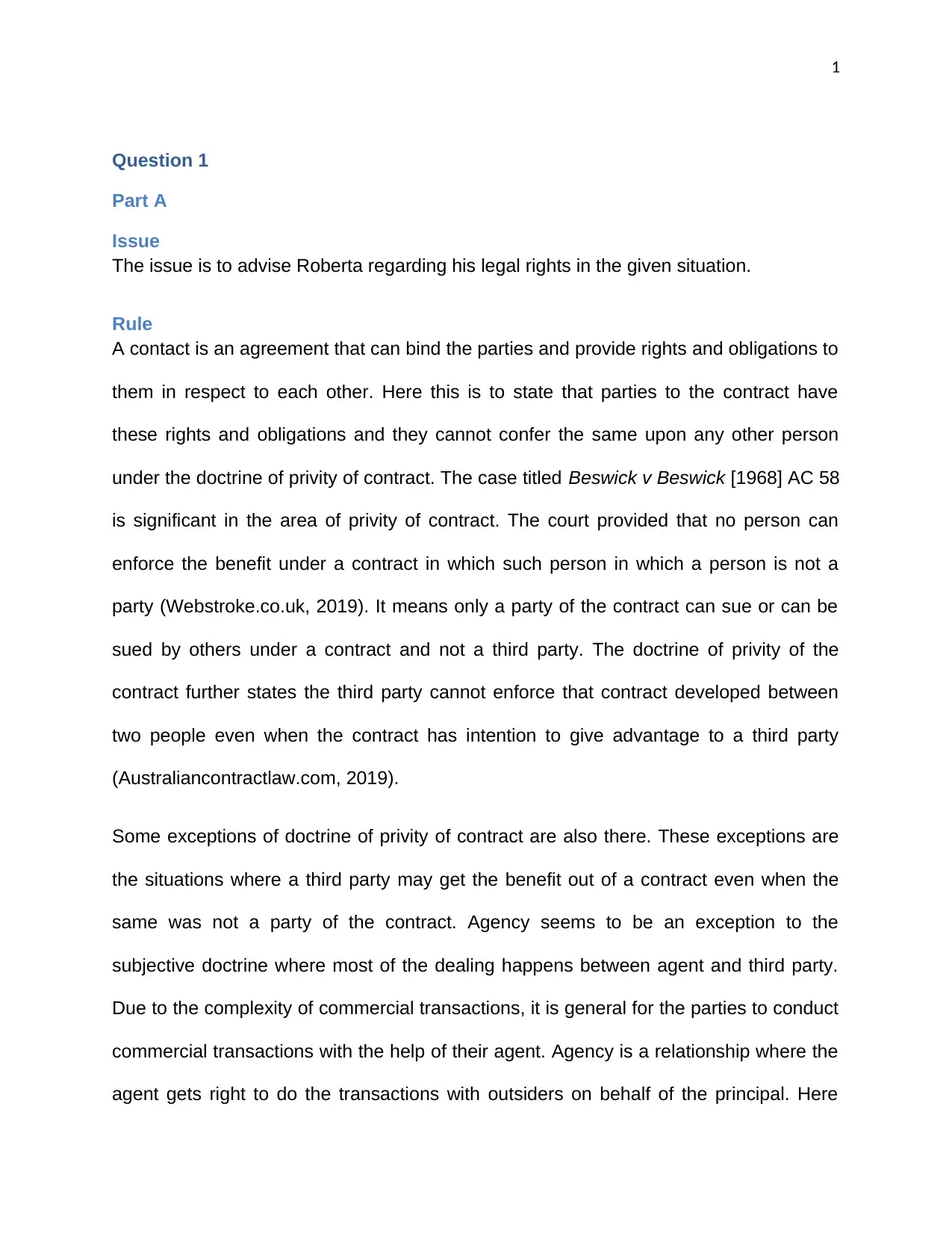
1
Question 1
Part A
Issue
The issue is to advise Roberta regarding his legal rights in the given situation.
Rule
A contact is an agreement that can bind the parties and provide rights and obligations to
them in respect to each other. Here this is to state that parties to the contract have
these rights and obligations and they cannot confer the same upon any other person
under the doctrine of privity of contract. The case titled Beswick v Beswick [1968] AC 58
is significant in the area of privity of contract. The court provided that no person can
enforce the benefit under a contract in which such person in which a person is not a
party (Webstroke.co.uk, 2019). It means only a party of the contract can sue or can be
sued by others under a contract and not a third party. The doctrine of privity of the
contract further states the third party cannot enforce that contract developed between
two people even when the contract has intention to give advantage to a third party
(Australiancontractlaw.com, 2019).
Some exceptions of doctrine of privity of contract are also there. These exceptions are
the situations where a third party may get the benefit out of a contract even when the
same was not a party of the contract. Agency seems to be an exception to the
subjective doctrine where most of the dealing happens between agent and third party.
Due to the complexity of commercial transactions, it is general for the parties to conduct
commercial transactions with the help of their agent. Agency is a relationship where the
agent gets right to do the transactions with outsiders on behalf of the principal. Here
Question 1
Part A
Issue
The issue is to advise Roberta regarding his legal rights in the given situation.
Rule
A contact is an agreement that can bind the parties and provide rights and obligations to
them in respect to each other. Here this is to state that parties to the contract have
these rights and obligations and they cannot confer the same upon any other person
under the doctrine of privity of contract. The case titled Beswick v Beswick [1968] AC 58
is significant in the area of privity of contract. The court provided that no person can
enforce the benefit under a contract in which such person in which a person is not a
party (Webstroke.co.uk, 2019). It means only a party of the contract can sue or can be
sued by others under a contract and not a third party. The doctrine of privity of the
contract further states the third party cannot enforce that contract developed between
two people even when the contract has intention to give advantage to a third party
(Australiancontractlaw.com, 2019).
Some exceptions of doctrine of privity of contract are also there. These exceptions are
the situations where a third party may get the benefit out of a contract even when the
same was not a party of the contract. Agency seems to be an exception to the
subjective doctrine where most of the dealing happens between agent and third party.
Due to the complexity of commercial transactions, it is general for the parties to conduct
commercial transactions with the help of their agent. Agency is a relationship where the
agent gets right to do the transactions with outsiders on behalf of the principal. Here
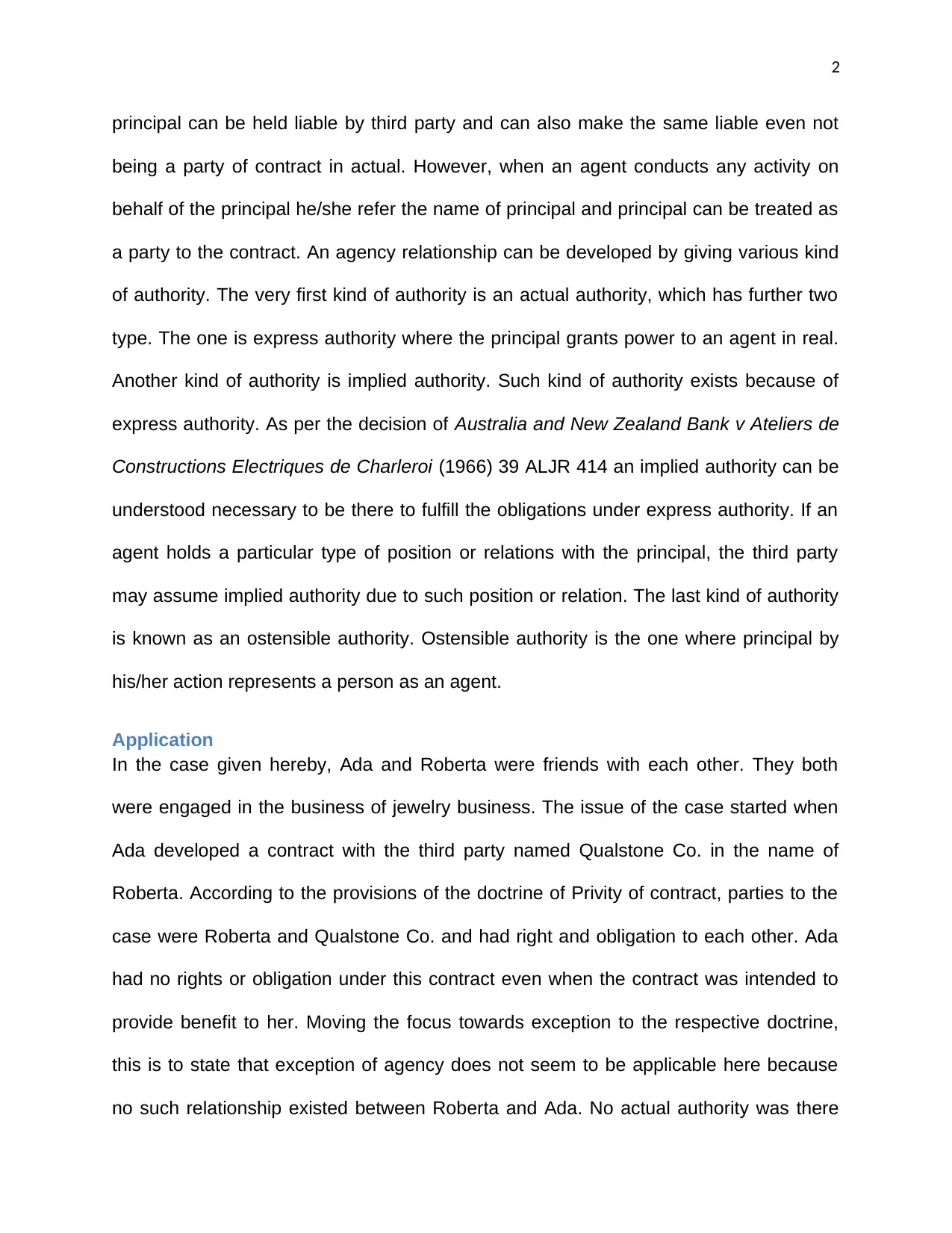
2
principal can be held liable by third party and can also make the same liable even not
being a party of contract in actual. However, when an agent conducts any activity on
behalf of the principal he/she refer the name of principal and principal can be treated as
a party to the contract. An agency relationship can be developed by giving various kind
of authority. The very first kind of authority is an actual authority, which has further two
type. The one is express authority where the principal grants power to an agent in real.
Another kind of authority is implied authority. Such kind of authority exists because of
express authority. As per the decision of Australia and New Zealand Bank v Ateliers de
Constructions Electriques de Charleroi (1966) 39 ALJR 414 an implied authority can be
understood necessary to be there to fulfill the obligations under express authority. If an
agent holds a particular type of position or relations with the principal, the third party
may assume implied authority due to such position or relation. The last kind of authority
is known as an ostensible authority. Ostensible authority is the one where principal by
his/her action represents a person as an agent.
Application
In the case given hereby, Ada and Roberta were friends with each other. They both
were engaged in the business of jewelry business. The issue of the case started when
Ada developed a contract with the third party named Qualstone Co. in the name of
Roberta. According to the provisions of the doctrine of Privity of contract, parties to the
case were Roberta and Qualstone Co. and had right and obligation to each other. Ada
had no rights or obligation under this contract even when the contract was intended to
provide benefit to her. Moving the focus towards exception to the respective doctrine,
this is to state that exception of agency does not seem to be applicable here because
no such relationship existed between Roberta and Ada. No actual authority was there
principal can be held liable by third party and can also make the same liable even not
being a party of contract in actual. However, when an agent conducts any activity on
behalf of the principal he/she refer the name of principal and principal can be treated as
a party to the contract. An agency relationship can be developed by giving various kind
of authority. The very first kind of authority is an actual authority, which has further two
type. The one is express authority where the principal grants power to an agent in real.
Another kind of authority is implied authority. Such kind of authority exists because of
express authority. As per the decision of Australia and New Zealand Bank v Ateliers de
Constructions Electriques de Charleroi (1966) 39 ALJR 414 an implied authority can be
understood necessary to be there to fulfill the obligations under express authority. If an
agent holds a particular type of position or relations with the principal, the third party
may assume implied authority due to such position or relation. The last kind of authority
is known as an ostensible authority. Ostensible authority is the one where principal by
his/her action represents a person as an agent.
Application
In the case given hereby, Ada and Roberta were friends with each other. They both
were engaged in the business of jewelry business. The issue of the case started when
Ada developed a contract with the third party named Qualstone Co. in the name of
Roberta. According to the provisions of the doctrine of Privity of contract, parties to the
case were Roberta and Qualstone Co. and had right and obligation to each other. Ada
had no rights or obligation under this contract even when the contract was intended to
provide benefit to her. Moving the focus towards exception to the respective doctrine,
this is to state that exception of agency does not seem to be applicable here because
no such relationship existed between Roberta and Ada. No actual authority was there
⊘ This is a preview!⊘
Do you want full access?
Subscribe today to unlock all pages.

Trusted by 1+ million students worldwide
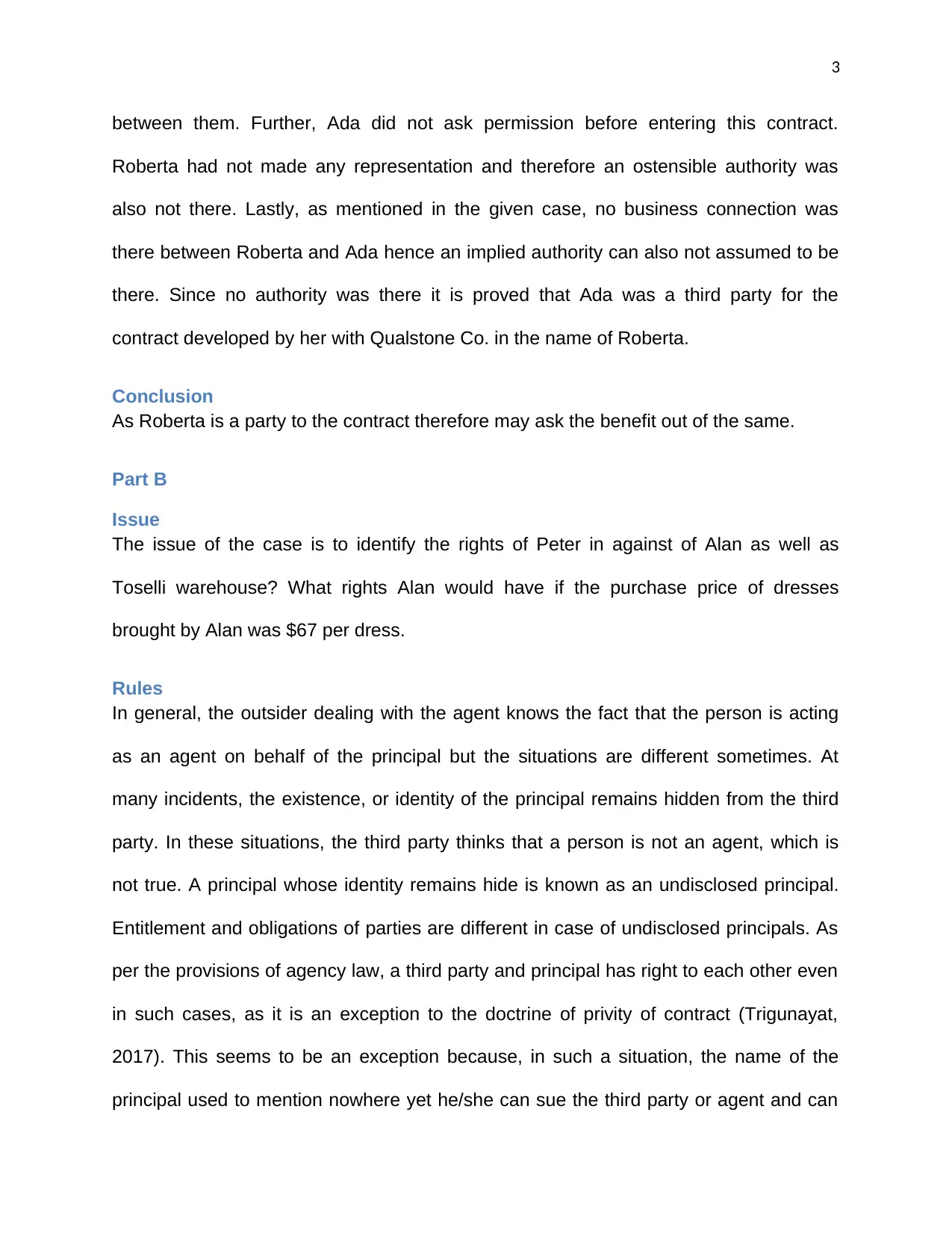
3
between them. Further, Ada did not ask permission before entering this contract.
Roberta had not made any representation and therefore an ostensible authority was
also not there. Lastly, as mentioned in the given case, no business connection was
there between Roberta and Ada hence an implied authority can also not assumed to be
there. Since no authority was there it is proved that Ada was a third party for the
contract developed by her with Qualstone Co. in the name of Roberta.
Conclusion
As Roberta is a party to the contract therefore may ask the benefit out of the same.
Part B
Issue
The issue of the case is to identify the rights of Peter in against of Alan as well as
Toselli warehouse? What rights Alan would have if the purchase price of dresses
brought by Alan was $67 per dress.
Rules
In general, the outsider dealing with the agent knows the fact that the person is acting
as an agent on behalf of the principal but the situations are different sometimes. At
many incidents, the existence, or identity of the principal remains hidden from the third
party. In these situations, the third party thinks that a person is not an agent, which is
not true. A principal whose identity remains hide is known as an undisclosed principal.
Entitlement and obligations of parties are different in case of undisclosed principals. As
per the provisions of agency law, a third party and principal has right to each other even
in such cases, as it is an exception to the doctrine of privity of contract (Trigunayat,
2017). This seems to be an exception because, in such a situation, the name of the
principal used to mention nowhere yet he/she can sue the third party or agent and can
between them. Further, Ada did not ask permission before entering this contract.
Roberta had not made any representation and therefore an ostensible authority was
also not there. Lastly, as mentioned in the given case, no business connection was
there between Roberta and Ada hence an implied authority can also not assumed to be
there. Since no authority was there it is proved that Ada was a third party for the
contract developed by her with Qualstone Co. in the name of Roberta.
Conclusion
As Roberta is a party to the contract therefore may ask the benefit out of the same.
Part B
Issue
The issue of the case is to identify the rights of Peter in against of Alan as well as
Toselli warehouse? What rights Alan would have if the purchase price of dresses
brought by Alan was $67 per dress.
Rules
In general, the outsider dealing with the agent knows the fact that the person is acting
as an agent on behalf of the principal but the situations are different sometimes. At
many incidents, the existence, or identity of the principal remains hidden from the third
party. In these situations, the third party thinks that a person is not an agent, which is
not true. A principal whose identity remains hide is known as an undisclosed principal.
Entitlement and obligations of parties are different in case of undisclosed principals. As
per the provisions of agency law, a third party and principal has right to each other even
in such cases, as it is an exception to the doctrine of privity of contract (Trigunayat,
2017). This seems to be an exception because, in such a situation, the name of the
principal used to mention nowhere yet he/she can sue the third party or agent and can
Paraphrase This Document
Need a fresh take? Get an instant paraphrase of this document with our AI Paraphraser
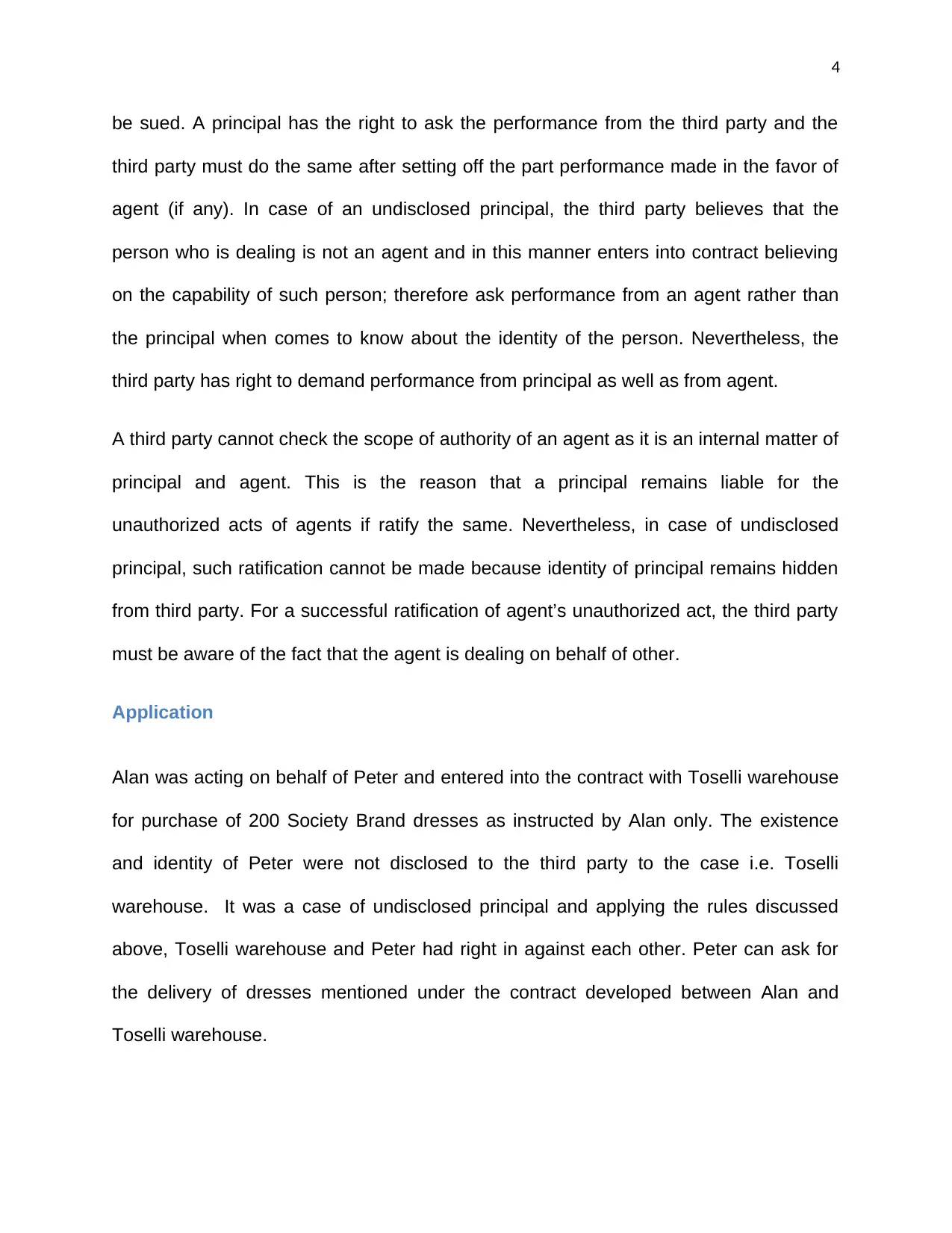
4
be sued. A principal has the right to ask the performance from the third party and the
third party must do the same after setting off the part performance made in the favor of
agent (if any). In case of an undisclosed principal, the third party believes that the
person who is dealing is not an agent and in this manner enters into contract believing
on the capability of such person; therefore ask performance from an agent rather than
the principal when comes to know about the identity of the person. Nevertheless, the
third party has right to demand performance from principal as well as from agent.
A third party cannot check the scope of authority of an agent as it is an internal matter of
principal and agent. This is the reason that a principal remains liable for the
unauthorized acts of agents if ratify the same. Nevertheless, in case of undisclosed
principal, such ratification cannot be made because identity of principal remains hidden
from third party. For a successful ratification of agent’s unauthorized act, the third party
must be aware of the fact that the agent is dealing on behalf of other.
Application
Alan was acting on behalf of Peter and entered into the contract with Toselli warehouse
for purchase of 200 Society Brand dresses as instructed by Alan only. The existence
and identity of Peter were not disclosed to the third party to the case i.e. Toselli
warehouse. It was a case of undisclosed principal and applying the rules discussed
above, Toselli warehouse and Peter had right in against each other. Peter can ask for
the delivery of dresses mentioned under the contract developed between Alan and
Toselli warehouse.
be sued. A principal has the right to ask the performance from the third party and the
third party must do the same after setting off the part performance made in the favor of
agent (if any). In case of an undisclosed principal, the third party believes that the
person who is dealing is not an agent and in this manner enters into contract believing
on the capability of such person; therefore ask performance from an agent rather than
the principal when comes to know about the identity of the person. Nevertheless, the
third party has right to demand performance from principal as well as from agent.
A third party cannot check the scope of authority of an agent as it is an internal matter of
principal and agent. This is the reason that a principal remains liable for the
unauthorized acts of agents if ratify the same. Nevertheless, in case of undisclosed
principal, such ratification cannot be made because identity of principal remains hidden
from third party. For a successful ratification of agent’s unauthorized act, the third party
must be aware of the fact that the agent is dealing on behalf of other.
Application
Alan was acting on behalf of Peter and entered into the contract with Toselli warehouse
for purchase of 200 Society Brand dresses as instructed by Alan only. The existence
and identity of Peter were not disclosed to the third party to the case i.e. Toselli
warehouse. It was a case of undisclosed principal and applying the rules discussed
above, Toselli warehouse and Peter had right in against each other. Peter can ask for
the delivery of dresses mentioned under the contract developed between Alan and
Toselli warehouse.
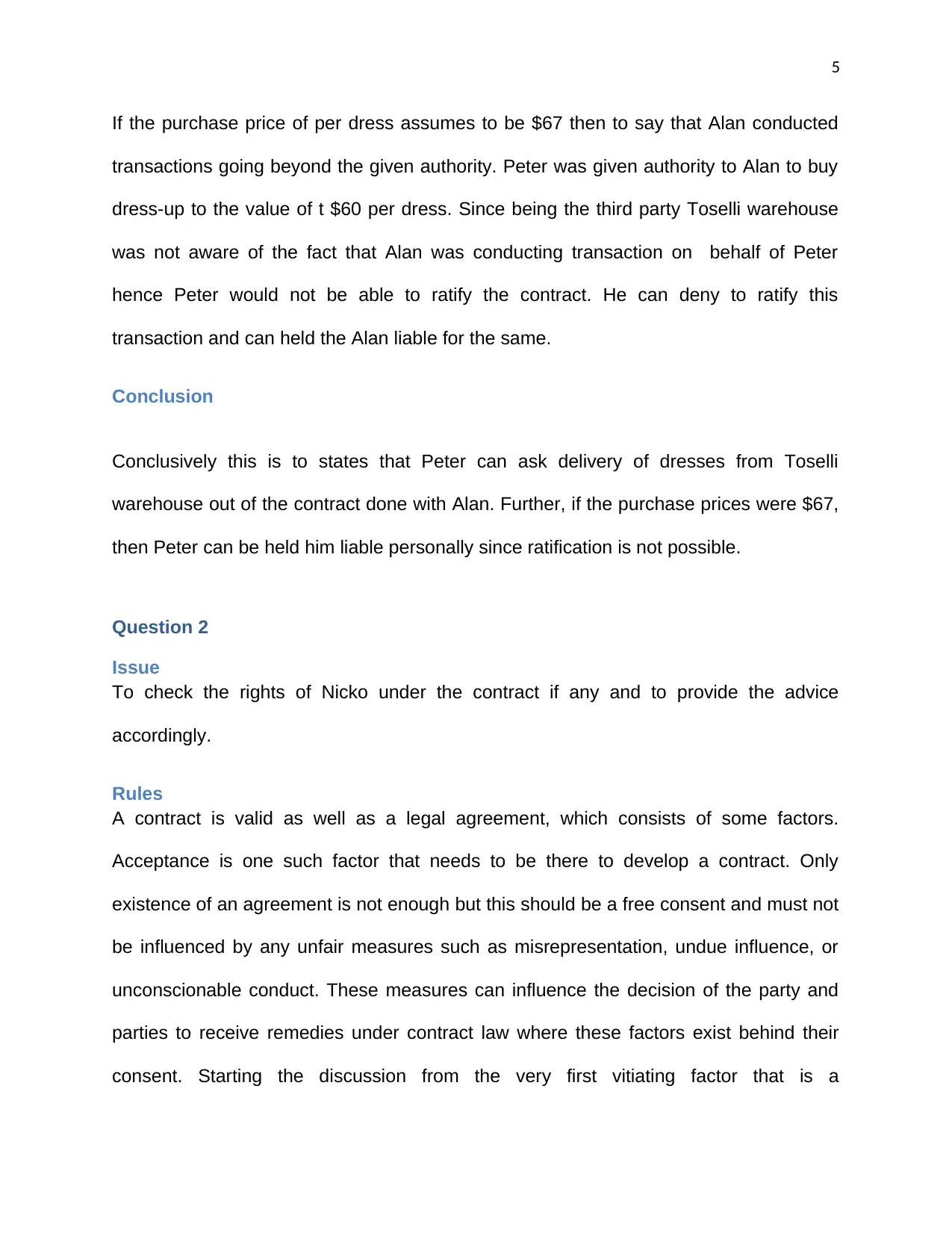
5
If the purchase price of per dress assumes to be $67 then to say that Alan conducted
transactions going beyond the given authority. Peter was given authority to Alan to buy
dress-up to the value of t $60 per dress. Since being the third party Toselli warehouse
was not aware of the fact that Alan was conducting transaction on behalf of Peter
hence Peter would not be able to ratify the contract. He can deny to ratify this
transaction and can held the Alan liable for the same.
Conclusion
Conclusively this is to states that Peter can ask delivery of dresses from Toselli
warehouse out of the contract done with Alan. Further, if the purchase prices were $67,
then Peter can be held him liable personally since ratification is not possible.
Question 2
Issue
To check the rights of Nicko under the contract if any and to provide the advice
accordingly.
Rules
A contract is valid as well as a legal agreement, which consists of some factors.
Acceptance is one such factor that needs to be there to develop a contract. Only
existence of an agreement is not enough but this should be a free consent and must not
be influenced by any unfair measures such as misrepresentation, undue influence, or
unconscionable conduct. These measures can influence the decision of the party and
parties to receive remedies under contract law where these factors exist behind their
consent. Starting the discussion from the very first vitiating factor that is a
If the purchase price of per dress assumes to be $67 then to say that Alan conducted
transactions going beyond the given authority. Peter was given authority to Alan to buy
dress-up to the value of t $60 per dress. Since being the third party Toselli warehouse
was not aware of the fact that Alan was conducting transaction on behalf of Peter
hence Peter would not be able to ratify the contract. He can deny to ratify this
transaction and can held the Alan liable for the same.
Conclusion
Conclusively this is to states that Peter can ask delivery of dresses from Toselli
warehouse out of the contract done with Alan. Further, if the purchase prices were $67,
then Peter can be held him liable personally since ratification is not possible.
Question 2
Issue
To check the rights of Nicko under the contract if any and to provide the advice
accordingly.
Rules
A contract is valid as well as a legal agreement, which consists of some factors.
Acceptance is one such factor that needs to be there to develop a contract. Only
existence of an agreement is not enough but this should be a free consent and must not
be influenced by any unfair measures such as misrepresentation, undue influence, or
unconscionable conduct. These measures can influence the decision of the party and
parties to receive remedies under contract law where these factors exist behind their
consent. Starting the discussion from the very first vitiating factor that is a
⊘ This is a preview!⊘
Do you want full access?
Subscribe today to unlock all pages.

Trusted by 1+ million students worldwide
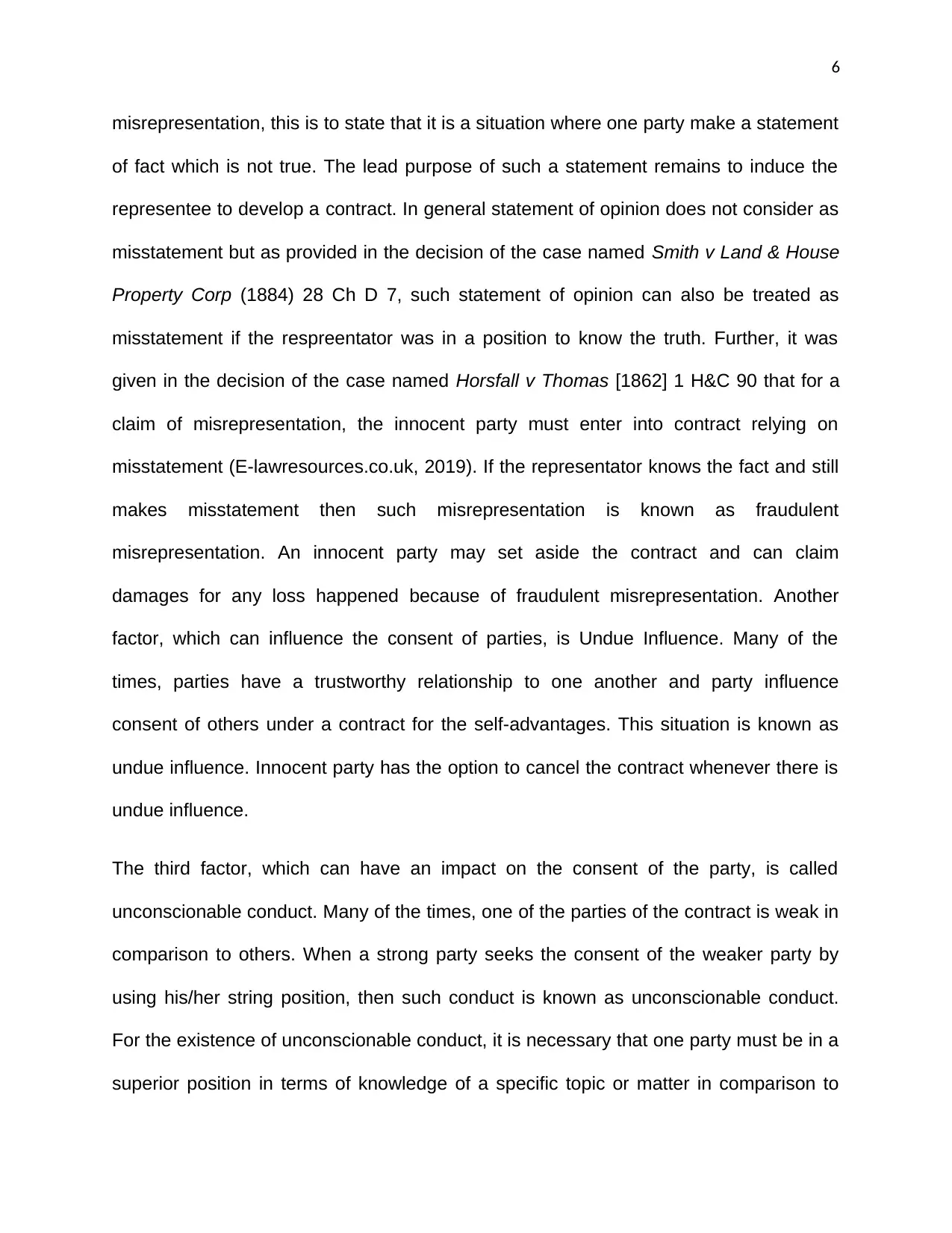
6
misrepresentation, this is to state that it is a situation where one party make a statement
of fact which is not true. The lead purpose of such a statement remains to induce the
representee to develop a contract. In general statement of opinion does not consider as
misstatement but as provided in the decision of the case named Smith v Land & House
Property Corp (1884) 28 Ch D 7, such statement of opinion can also be treated as
misstatement if the respreentator was in a position to know the truth. Further, it was
given in the decision of the case named Horsfall v Thomas [1862] 1 H&C 90 that for a
claim of misrepresentation, the innocent party must enter into contract relying on
misstatement (E-lawresources.co.uk, 2019). If the representator knows the fact and still
makes misstatement then such misrepresentation is known as fraudulent
misrepresentation. An innocent party may set aside the contract and can claim
damages for any loss happened because of fraudulent misrepresentation. Another
factor, which can influence the consent of parties, is Undue Influence. Many of the
times, parties have a trustworthy relationship to one another and party influence
consent of others under a contract for the self-advantages. This situation is known as
undue influence. Innocent party has the option to cancel the contract whenever there is
undue influence.
The third factor, which can have an impact on the consent of the party, is called
unconscionable conduct. Many of the times, one of the parties of the contract is weak in
comparison to others. When a strong party seeks the consent of the weaker party by
using his/her string position, then such conduct is known as unconscionable conduct.
For the existence of unconscionable conduct, it is necessary that one party must be in a
superior position in terms of knowledge of a specific topic or matter in comparison to
misrepresentation, this is to state that it is a situation where one party make a statement
of fact which is not true. The lead purpose of such a statement remains to induce the
representee to develop a contract. In general statement of opinion does not consider as
misstatement but as provided in the decision of the case named Smith v Land & House
Property Corp (1884) 28 Ch D 7, such statement of opinion can also be treated as
misstatement if the respreentator was in a position to know the truth. Further, it was
given in the decision of the case named Horsfall v Thomas [1862] 1 H&C 90 that for a
claim of misrepresentation, the innocent party must enter into contract relying on
misstatement (E-lawresources.co.uk, 2019). If the representator knows the fact and still
makes misstatement then such misrepresentation is known as fraudulent
misrepresentation. An innocent party may set aside the contract and can claim
damages for any loss happened because of fraudulent misrepresentation. Another
factor, which can influence the consent of parties, is Undue Influence. Many of the
times, parties have a trustworthy relationship to one another and party influence
consent of others under a contract for the self-advantages. This situation is known as
undue influence. Innocent party has the option to cancel the contract whenever there is
undue influence.
The third factor, which can have an impact on the consent of the party, is called
unconscionable conduct. Many of the times, one of the parties of the contract is weak in
comparison to others. When a strong party seeks the consent of the weaker party by
using his/her string position, then such conduct is known as unconscionable conduct.
For the existence of unconscionable conduct, it is necessary that one party must be in a
superior position in terms of knowledge of a specific topic or matter in comparison to
Paraphrase This Document
Need a fresh take? Get an instant paraphrase of this document with our AI Paraphraser
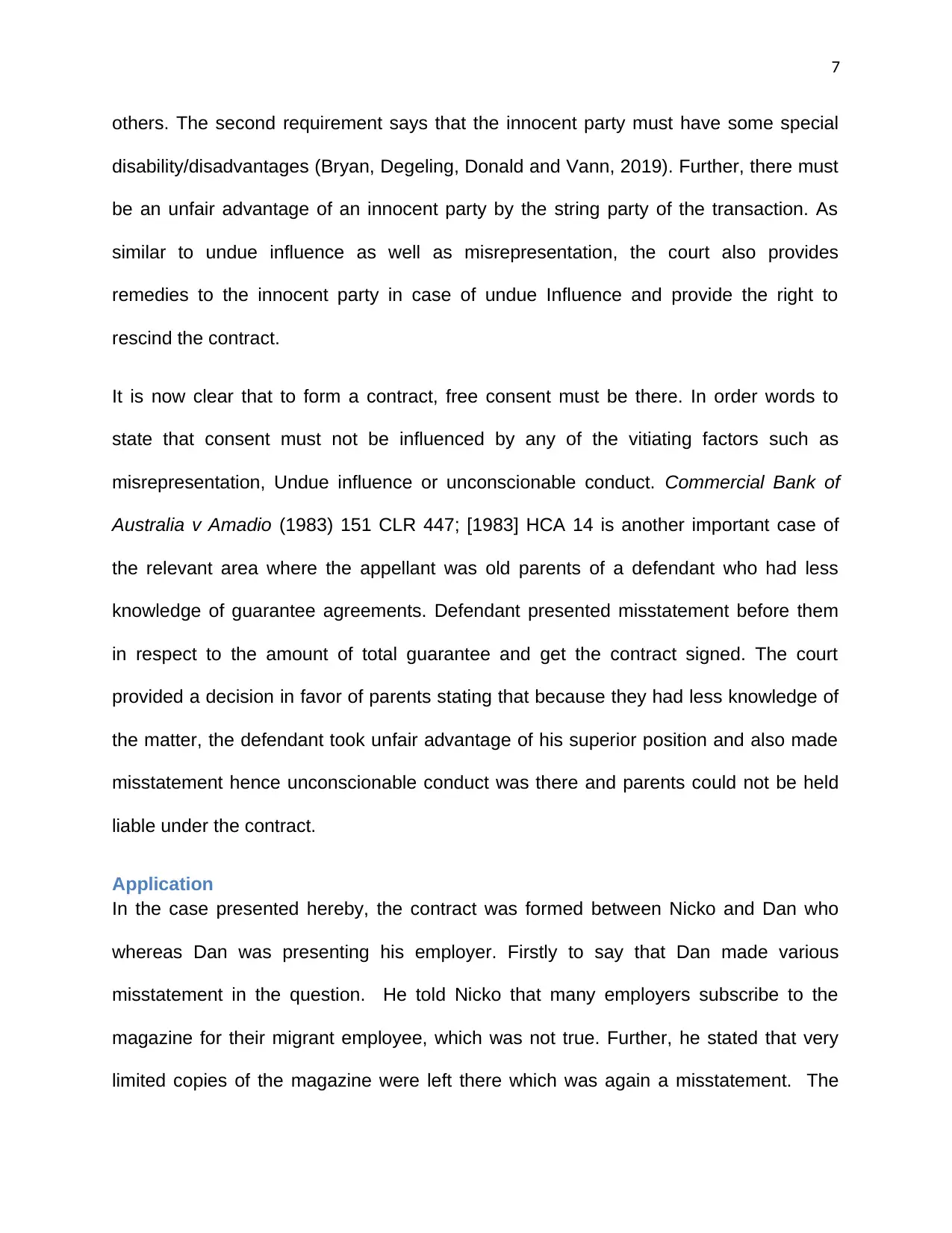
7
others. The second requirement says that the innocent party must have some special
disability/disadvantages (Bryan, Degeling, Donald and Vann, 2019). Further, there must
be an unfair advantage of an innocent party by the string party of the transaction. As
similar to undue influence as well as misrepresentation, the court also provides
remedies to the innocent party in case of undue Influence and provide the right to
rescind the contract.
It is now clear that to form a contract, free consent must be there. In order words to
state that consent must not be influenced by any of the vitiating factors such as
misrepresentation, Undue influence or unconscionable conduct. Commercial Bank of
Australia v Amadio (1983) 151 CLR 447; [1983] HCA 14 is another important case of
the relevant area where the appellant was old parents of a defendant who had less
knowledge of guarantee agreements. Defendant presented misstatement before them
in respect to the amount of total guarantee and get the contract signed. The court
provided a decision in favor of parents stating that because they had less knowledge of
the matter, the defendant took unfair advantage of his superior position and also made
misstatement hence unconscionable conduct was there and parents could not be held
liable under the contract.
Application
In the case presented hereby, the contract was formed between Nicko and Dan who
whereas Dan was presenting his employer. Firstly to say that Dan made various
misstatement in the question. He told Nicko that many employers subscribe to the
magazine for their migrant employee, which was not true. Further, he stated that very
limited copies of the magazine were left there which was again a misstatement. The
others. The second requirement says that the innocent party must have some special
disability/disadvantages (Bryan, Degeling, Donald and Vann, 2019). Further, there must
be an unfair advantage of an innocent party by the string party of the transaction. As
similar to undue influence as well as misrepresentation, the court also provides
remedies to the innocent party in case of undue Influence and provide the right to
rescind the contract.
It is now clear that to form a contract, free consent must be there. In order words to
state that consent must not be influenced by any of the vitiating factors such as
misrepresentation, Undue influence or unconscionable conduct. Commercial Bank of
Australia v Amadio (1983) 151 CLR 447; [1983] HCA 14 is another important case of
the relevant area where the appellant was old parents of a defendant who had less
knowledge of guarantee agreements. Defendant presented misstatement before them
in respect to the amount of total guarantee and get the contract signed. The court
provided a decision in favor of parents stating that because they had less knowledge of
the matter, the defendant took unfair advantage of his superior position and also made
misstatement hence unconscionable conduct was there and parents could not be held
liable under the contract.
Application
In the case presented hereby, the contract was formed between Nicko and Dan who
whereas Dan was presenting his employer. Firstly to say that Dan made various
misstatement in the question. He told Nicko that many employers subscribe to the
magazine for their migrant employee, which was not true. Further, he stated that very
limited copies of the magazine were left there which was again a misstatement. The
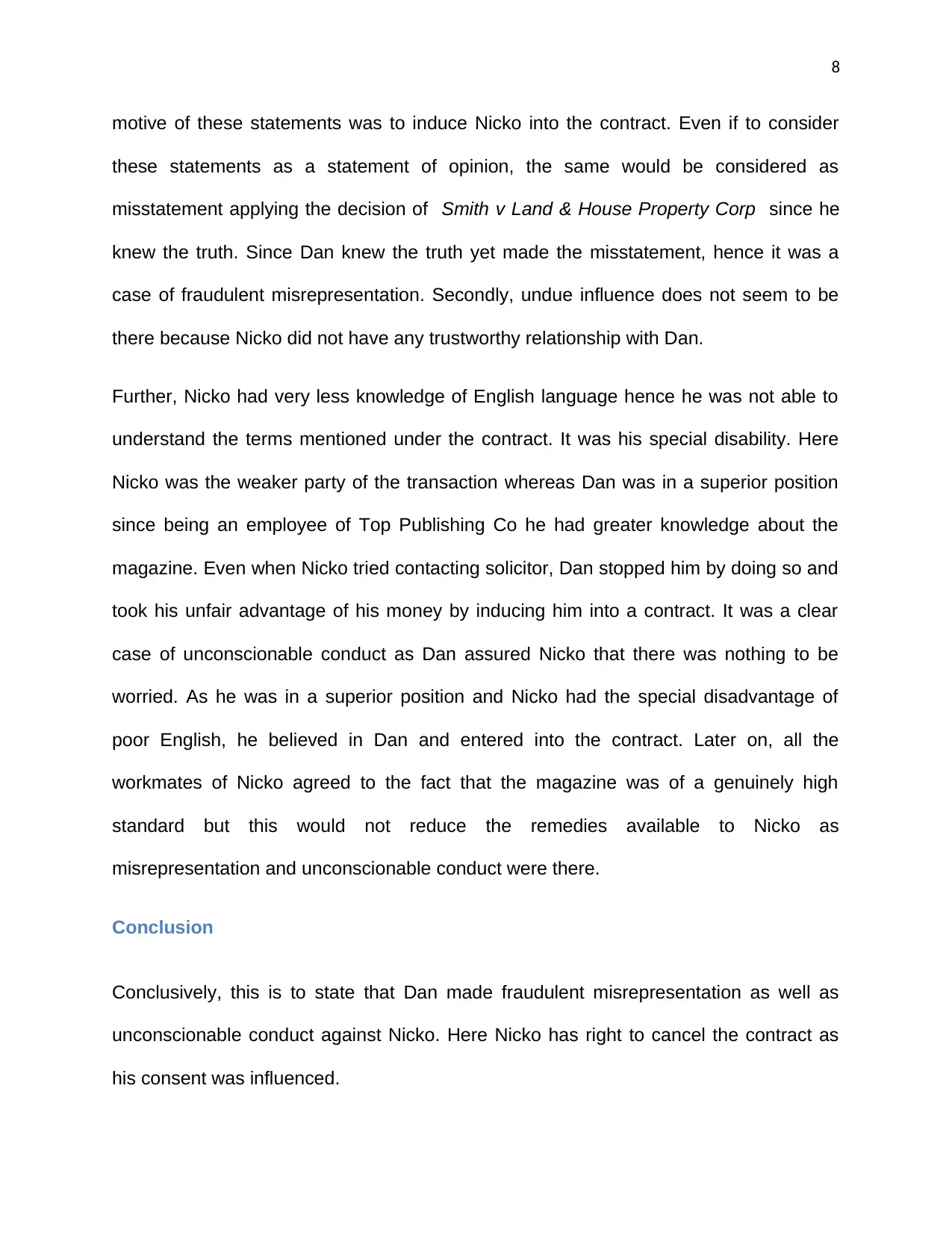
8
motive of these statements was to induce Nicko into the contract. Even if to consider
these statements as a statement of opinion, the same would be considered as
misstatement applying the decision of Smith v Land & House Property Corp since he
knew the truth. Since Dan knew the truth yet made the misstatement, hence it was a
case of fraudulent misrepresentation. Secondly, undue influence does not seem to be
there because Nicko did not have any trustworthy relationship with Dan.
Further, Nicko had very less knowledge of English language hence he was not able to
understand the terms mentioned under the contract. It was his special disability. Here
Nicko was the weaker party of the transaction whereas Dan was in a superior position
since being an employee of Top Publishing Co he had greater knowledge about the
magazine. Even when Nicko tried contacting solicitor, Dan stopped him by doing so and
took his unfair advantage of his money by inducing him into a contract. It was a clear
case of unconscionable conduct as Dan assured Nicko that there was nothing to be
worried. As he was in a superior position and Nicko had the special disadvantage of
poor English, he believed in Dan and entered into the contract. Later on, all the
workmates of Nicko agreed to the fact that the magazine was of a genuinely high
standard but this would not reduce the remedies available to Nicko as
misrepresentation and unconscionable conduct were there.
Conclusion
Conclusively, this is to state that Dan made fraudulent misrepresentation as well as
unconscionable conduct against Nicko. Here Nicko has right to cancel the contract as
his consent was influenced.
motive of these statements was to induce Nicko into the contract. Even if to consider
these statements as a statement of opinion, the same would be considered as
misstatement applying the decision of Smith v Land & House Property Corp since he
knew the truth. Since Dan knew the truth yet made the misstatement, hence it was a
case of fraudulent misrepresentation. Secondly, undue influence does not seem to be
there because Nicko did not have any trustworthy relationship with Dan.
Further, Nicko had very less knowledge of English language hence he was not able to
understand the terms mentioned under the contract. It was his special disability. Here
Nicko was the weaker party of the transaction whereas Dan was in a superior position
since being an employee of Top Publishing Co he had greater knowledge about the
magazine. Even when Nicko tried contacting solicitor, Dan stopped him by doing so and
took his unfair advantage of his money by inducing him into a contract. It was a clear
case of unconscionable conduct as Dan assured Nicko that there was nothing to be
worried. As he was in a superior position and Nicko had the special disadvantage of
poor English, he believed in Dan and entered into the contract. Later on, all the
workmates of Nicko agreed to the fact that the magazine was of a genuinely high
standard but this would not reduce the remedies available to Nicko as
misrepresentation and unconscionable conduct were there.
Conclusion
Conclusively, this is to state that Dan made fraudulent misrepresentation as well as
unconscionable conduct against Nicko. Here Nicko has right to cancel the contract as
his consent was influenced.
⊘ This is a preview!⊘
Do you want full access?
Subscribe today to unlock all pages.

Trusted by 1+ million students worldwide

9
Paraphrase This Document
Need a fresh take? Get an instant paraphrase of this document with our AI Paraphraser
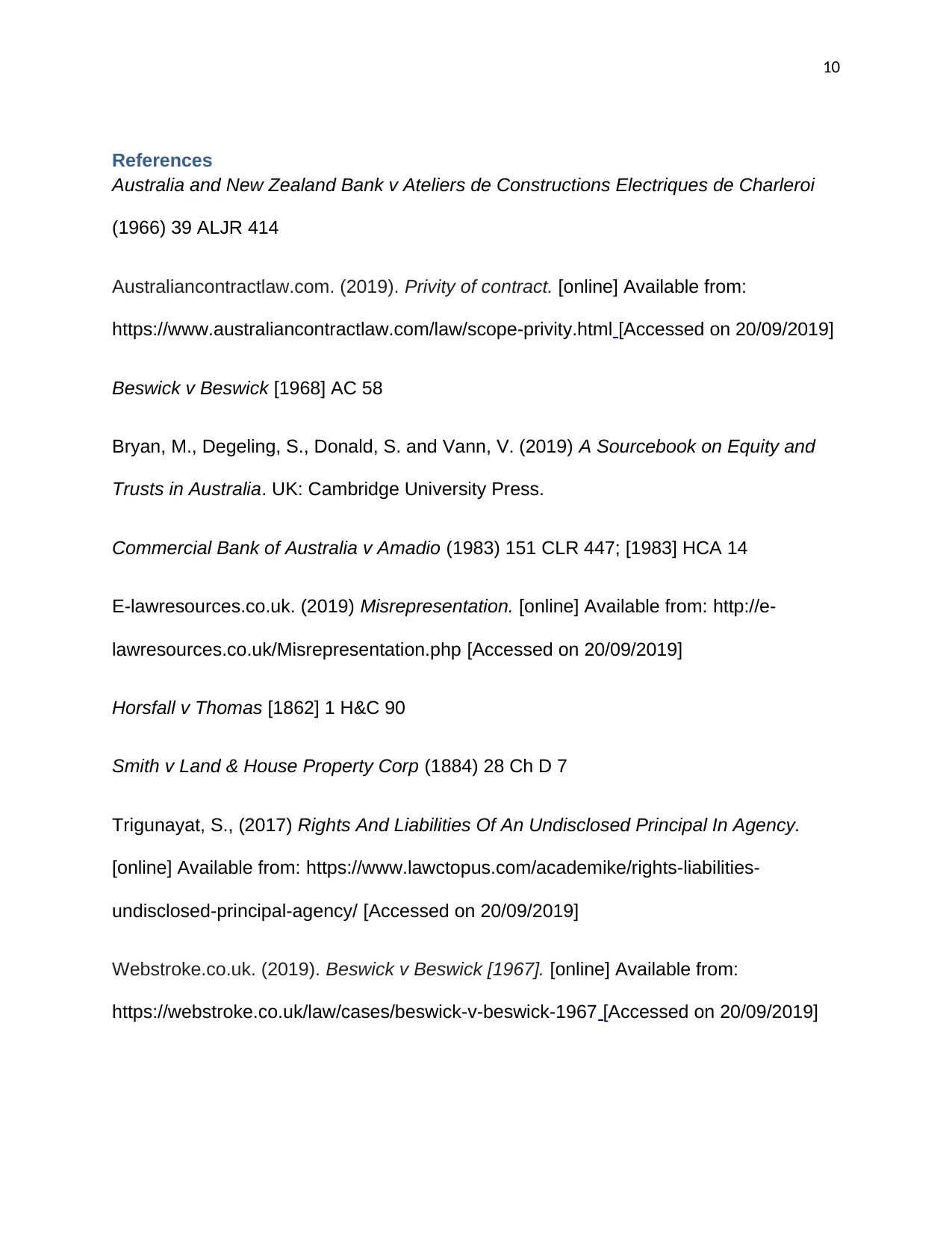
10
References
Australia and New Zealand Bank v Ateliers de Constructions Electriques de Charleroi
(1966) 39 ALJR 414
Australiancontractlaw.com. (2019). Privity of contract. [online] Available from:
https://www.australiancontractlaw.com/law/scope-privity.html [Accessed on 20/09/2019]
Beswick v Beswick [1968] AC 58
Bryan, M., Degeling, S., Donald, S. and Vann, V. (2019) A Sourcebook on Equity and
Trusts in Australia. UK: Cambridge University Press.
Commercial Bank of Australia v Amadio (1983) 151 CLR 447; [1983] HCA 14
E-lawresources.co.uk. (2019) Misrepresentation. [online] Available from: http://e-
lawresources.co.uk/Misrepresentation.php [Accessed on 20/09/2019]
Horsfall v Thomas [1862] 1 H&C 90
Smith v Land & House Property Corp (1884) 28 Ch D 7
Trigunayat, S., (2017) Rights And Liabilities Of An Undisclosed Principal In Agency.
[online] Available from: https://www.lawctopus.com/academike/rights-liabilities-
undisclosed-principal-agency/ [Accessed on 20/09/2019]
Webstroke.co.uk. (2019). Beswick v Beswick [1967]. [online] Available from:
https://webstroke.co.uk/law/cases/beswick-v-beswick-1967 [Accessed on 20/09/2019]
References
Australia and New Zealand Bank v Ateliers de Constructions Electriques de Charleroi
(1966) 39 ALJR 414
Australiancontractlaw.com. (2019). Privity of contract. [online] Available from:
https://www.australiancontractlaw.com/law/scope-privity.html [Accessed on 20/09/2019]
Beswick v Beswick [1968] AC 58
Bryan, M., Degeling, S., Donald, S. and Vann, V. (2019) A Sourcebook on Equity and
Trusts in Australia. UK: Cambridge University Press.
Commercial Bank of Australia v Amadio (1983) 151 CLR 447; [1983] HCA 14
E-lawresources.co.uk. (2019) Misrepresentation. [online] Available from: http://e-
lawresources.co.uk/Misrepresentation.php [Accessed on 20/09/2019]
Horsfall v Thomas [1862] 1 H&C 90
Smith v Land & House Property Corp (1884) 28 Ch D 7
Trigunayat, S., (2017) Rights And Liabilities Of An Undisclosed Principal In Agency.
[online] Available from: https://www.lawctopus.com/academike/rights-liabilities-
undisclosed-principal-agency/ [Accessed on 20/09/2019]
Webstroke.co.uk. (2019). Beswick v Beswick [1967]. [online] Available from:
https://webstroke.co.uk/law/cases/beswick-v-beswick-1967 [Accessed on 20/09/2019]
1 out of 11
Related Documents
Your All-in-One AI-Powered Toolkit for Academic Success.
+13062052269
info@desklib.com
Available 24*7 on WhatsApp / Email
![[object Object]](/_next/static/media/star-bottom.7253800d.svg)
Unlock your academic potential
Copyright © 2020–2025 A2Z Services. All Rights Reserved. Developed and managed by ZUCOL.




